Cadmus – Legendary Phoenician Hero And Founder Of Prosperous City Of Thebes
A. Sutherland - AncientPages.com - This legend is devoted to Cadmus, who in Greek mythology was the legendary Phoenician hero and founder of Boeotian Thebe, husband of Harmony, and one of the five sons of King Agenor ("heroic, manly") of Tyre.
Cadmus fighting the dragon depicted on an ancient vase. Credit: Louvre - Public Domain
The King sent his sons into the world for his sister Europa, whom Zeus kidnapped, and the brothers' task was challenging since their father ordered them to return when they found their sister.
Cadmus was, alongside Perseus and Bellerophon, the greatest hero and slayer of monsters before the days of the mighty Heracles.
Foundation Of the City of Cadmea (Thebes) And Killing Of A Dragon
Unsuccessfully searching for Europa, the brothers settled in Greece. Remembering his father's injunction not to return without his sister, Cadmus decided to come to rest outside his homeland. At first, however, he wanted to ask the oracle where he was to live.
She gave him some advice: follow the cow, which has a birthmark in the shape of a moon, and in this special place, you have to establish a new city and stay there. It took time to find a magical cow, but at last, Cadmus spotted the animal. King Pelagon of Fokis gave him the cow, and Cadmus unleashed it.
The cow wandered for quite a while before it got tired and lay down. Cadmus knew that it was this particular place destined for his new city. He built an altar where sacrifices could be made to the gods. He intended to sacrifice the cow in return for the guidance of the gods and sent some of his men to fetch water to wash themselves with. The men found a clear water spring and began filling the pots they had brought.
But soon, a snake-like dragon appeared. He guarded the spring belonging to the god of war, Ares, and did not let any man approach the water.
Quickly, the creature killed almost all the men. Cadmus had to kill a dragon to have access to a source of fresh water. Then, Athena instructed him to sow all the teeth of the beast, and so the hero did. An army of warriors ("Sown Men"- Spartoi) grew from the ground and fought against each other until the last five only remained, helping Cadmus build his new city of Thebes.
And yet, Cadmus suffered guilt for killing the Castalian serpent of the god of war. As punishment, he was forced to serve Ares for eight years. Then, he was awarded the lovely Harmonia.
Cadmus and Minerva (Minerva being the Roman version of Athena) - Jacob Jordaens (1593–1678). Credit: Public Domain
After his eight-year-long punishment, the goddess Athena secured him the land of Boeotia. With the help of his "Sown Men," he built the Theban acropolis, named 'The Cadmea' in his honor, and married Harmonia, the daughter of Aphrodite and Ares. According to a version, Athena had given her to him when he visited Samothrace, the home of the Sanctuary of the Great Gods, the site of important Hellenic and pre-Hellenic religious ceremonies.
Cadmus' wedding with Harmonia was the first mortal wedding ever attended by the Olympians. Twelve golden thrones were set up for them in Cadmus's house, which stood on the present Theban marketplace's site; they all brought gifts.
Aphrodite presented Harmonia with the famous golden necklace made by Hephaestus. Originally, it had been Zeus's love gift to Cadmus's sister Europe, conferring overwhelming beauty on its wearer.
They finally retired to Illyria and lived happily, but when the Illyrians later angered the gods and were punished, Cadmus and Harmonia were saved, being changed into black serpents and sent by Zeus to the Islands of the Blessed (Elysian Fields).
The later nobles of Thebes are said to have descended from these surviving legendary men. The Greeks attributed the foundation of Thebes to Cadmus, and he has a respectable place in Greek mythology. The Phoenician King from Tyre was famous for teaching the Phoenician alphabet and building the Acropolis, an intellectual, spiritual, and cultural center named the Cadmeia in his honor.
According to the Greek version of his story, Cadmus is the ancestor of Illyrians and Theban royalty. He was a good ruler for his people, making Thebes a prosperous city
Written by – A. Sutherland - AncientPages.com Senior Staff Writer
Updated on January 2, 2024
Copyright © AncientPages.com All rights reserved. This material may not be published, broadcast, rewritten or redistributed in whole or part without thexpress written permission of AncientPages.com
Expand for referencesReferences:
Leeming, D. The Oxford Companion to World Mythology
Cotterell, A. A Dictionary of World Mythology
raves, R. The Greek Myths
More From Ancient Pages
-
 Vetala – Vampire With Knowledge Of The Past, Present And Future In Hindu Mythology
Featured Stories | Jan 19, 2021
Vetala – Vampire With Knowledge Of The Past, Present And Future In Hindu Mythology
Featured Stories | Jan 19, 2021 -
 Are Thunderbird Petroglyphs In Bighorn Basin Linked To Golden Eagle Nests?
Civilizations | Apr 26, 2017
Are Thunderbird Petroglyphs In Bighorn Basin Linked To Golden Eagle Nests?
Civilizations | Apr 26, 2017 -
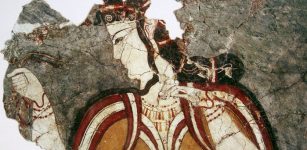 Genetic Mystery Solved: Ancient DNA Reveals Greeks Descended From The Minoans And The Mycenaeans
Archaeology | Aug 4, 2017
Genetic Mystery Solved: Ancient DNA Reveals Greeks Descended From The Minoans And The Mycenaeans
Archaeology | Aug 4, 2017 -
 Ancient Mystery Of The Enigmatic ‘Cat Men’ – The Arrival – Part 1
Ancient Mysteries | Jan 17, 2021
Ancient Mystery Of The Enigmatic ‘Cat Men’ – The Arrival – Part 1
Ancient Mysteries | Jan 17, 2021 -
 Mythical Kingdom Of Prester John – Did It Exist?
Featured Stories | Mar 21, 2016
Mythical Kingdom Of Prester John – Did It Exist?
Featured Stories | Mar 21, 2016 -
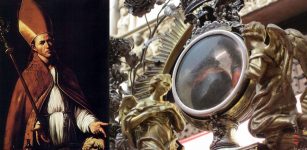 Blood Of St. Januarius – One Of The Most Remarkable Christian Relics
Artifacts | Jun 27, 2017
Blood Of St. Januarius – One Of The Most Remarkable Christian Relics
Artifacts | Jun 27, 2017 -
 Oldest Writing System Among Slavs To Be Germanic Runes – New Study
News | Feb 15, 2021
Oldest Writing System Among Slavs To Be Germanic Runes – New Study
News | Feb 15, 2021 -
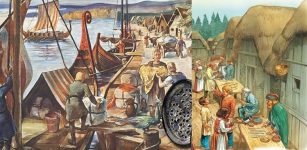 Félag – Ancient Viking Company Organized Trade Finance
Ancient History Facts | May 4, 2018
Félag – Ancient Viking Company Organized Trade Finance
Ancient History Facts | May 4, 2018 -
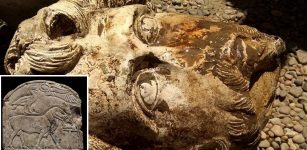 Ancient Shrine Of God Osiris-Ptah Neb And Rare Bust Of Emperor Marcus Aurelius Discovered In Egypt
Archaeology | Apr 28, 2018
Ancient Shrine Of God Osiris-Ptah Neb And Rare Bust Of Emperor Marcus Aurelius Discovered In Egypt
Archaeology | Apr 28, 2018 -
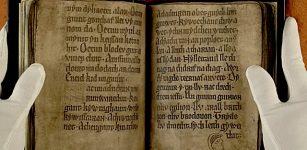 13th Century Black Book Of Carmarthen: Erased Poetry And Ghostly Faces Revealed By UV Light
Artifacts | Apr 4, 2015
13th Century Black Book Of Carmarthen: Erased Poetry And Ghostly Faces Revealed By UV Light
Artifacts | Apr 4, 2015 -
 95% Of All Modern Europeans Descended From The Seven Daughters Of Eve
Civilizations | Dec 12, 2019
95% Of All Modern Europeans Descended From The Seven Daughters Of Eve
Civilizations | Dec 12, 2019 -
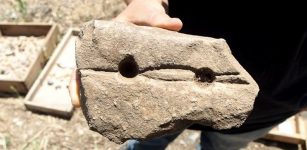 Stone Slab c. 9,000-Year-Old Used In Making Fire Discovered Not Far From Jerusalem, Israel
Archaeology | May 17, 2017
Stone Slab c. 9,000-Year-Old Used In Making Fire Discovered Not Far From Jerusalem, Israel
Archaeology | May 17, 2017 -
 Brochs: Ingeniously Engineered Windowless Iron Age Structures Of Atlantic Scotland
Featured Stories | Sep 20, 2023
Brochs: Ingeniously Engineered Windowless Iron Age Structures Of Atlantic Scotland
Featured Stories | Sep 20, 2023 -
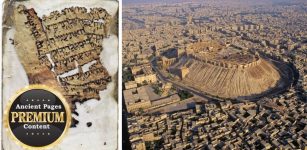 Unsolved Mystery Of The Aleppo Codex And Its Missing Pages: One Of The World’s Most Precious Ancient Books
Ancient Mysteries | Feb 27, 2017
Unsolved Mystery Of The Aleppo Codex And Its Missing Pages: One Of The World’s Most Precious Ancient Books
Ancient Mysteries | Feb 27, 2017 -
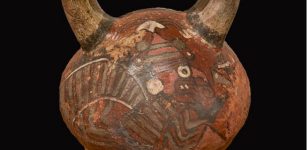 Colors On These Ancient Pots Hint At The Power Of An Empire
Archaeology | Mar 7, 2023
Colors On These Ancient Pots Hint At The Power Of An Empire
Archaeology | Mar 7, 2023 -
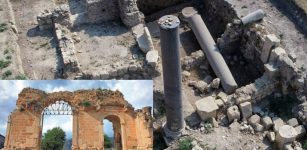 Rare Gladiator Tombs Found In Ancient City Of Anavarza In Southern Turkey
Archaeology | Aug 16, 2022
Rare Gladiator Tombs Found In Ancient City Of Anavarza In Southern Turkey
Archaeology | Aug 16, 2022 -
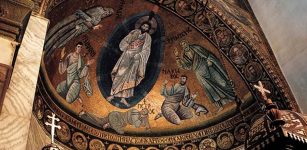 Ancient World’s Second Largest Library Of Codices, Manuscripts Reopened In Sinai
Archaeology | Dec 17, 2017
Ancient World’s Second Largest Library Of Codices, Manuscripts Reopened In Sinai
Archaeology | Dec 17, 2017 -
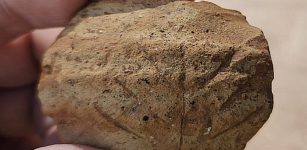 Intriguing Fragment Of A Byzantine-Era Jar Handle, Dating Back Approximately 1500 Years – Unearthed
Archaeology | Sep 5, 2023
Intriguing Fragment Of A Byzantine-Era Jar Handle, Dating Back Approximately 1500 Years – Unearthed
Archaeology | Sep 5, 2023 -
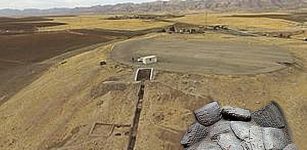 Bassetki Cuneiform Tablets Reveal Location Of Lost City Of Mardaman In Northern Mesopotamia
Archaeology | May 14, 2018
Bassetki Cuneiform Tablets Reveal Location Of Lost City Of Mardaman In Northern Mesopotamia
Archaeology | May 14, 2018 -
 Star-Shaped Magnetic Anomaly At Hidden Stone Circle In The Outer Hebrides Gives New Insight Into Ancient Beliefs
Archaeology | Jan 2, 2020
Star-Shaped Magnetic Anomaly At Hidden Stone Circle In The Outer Hebrides Gives New Insight Into Ancient Beliefs
Archaeology | Jan 2, 2020


